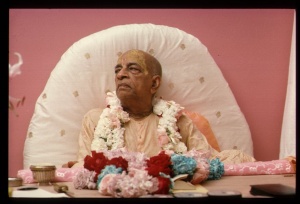CC Antya 20.55 (1975): Difference between revisions
(Vanibot #0027: CCMirror - Mirror CC's 1996 edition to form a basis for 1975) |
(Vanibot #0020: VersionCompareLinker - added a link to the Version Compare feature) |
||
| Line 2: | Line 2: | ||
<div style="float:left">'''[[Sri Caitanya-caritamrta (1975)|Śrī Caitanya-caritāmṛta (1975)]] - [[CC Antya (1975)|Antya-līlā]] - [[CC Antya 20 (1975)|Chapter 20: The Śikṣāṣṭaka Prayers]]'''</div> | <div style="float:left">'''[[Sri Caitanya-caritamrta (1975)|Śrī Caitanya-caritāmṛta (1975)]] - [[CC Antya (1975)|Antya-līlā]] - [[CC Antya 20 (1975)|Chapter 20: The Śikṣāṣṭaka Prayers]]'''</div> | ||
<div style="float:right">[[File:Go-previous.png|link=CC Antya 20.54 (1975)|Antya-līlā 20.54]] '''[[CC Antya 20.54 (1975)|Antya-līlā 20.54]] - [[CC Antya 20.56 (1975)|Antya-līlā 20.56]]''' [[File:Go-next.png|link=CC Antya 20.56 (1975)|Antya-līlā 20.56]]</div> | <div style="float:right">[[File:Go-previous.png|link=CC Antya 20.54 (1975)|Antya-līlā 20.54]] '''[[CC Antya 20.54 (1975)|Antya-līlā 20.54]] - [[CC Antya 20.56 (1975)|Antya-līlā 20.56]]''' [[File:Go-next.png|link=CC Antya 20.56 (1975)|Antya-līlā 20.56]]</div> | ||
{{CompareVersions|CC|Antya 20.55|CC 1975|CC 1996}} | |||
{{RandomImage}} | {{RandomImage}} | ||
==== TEXT 55 ==== | ==== TEXT 55 ==== | ||
<div class="verse"> | <div class="verse"> | ||
:sei nārī jīye kene, | :sei nārī jīye kene, kṛṣṇa-marma vyathā jāne, | ||
:tabu kṛṣṇe kare gāḍha roṣa | :tabu kṛṣṇe kare gāḍha roṣa | ||
:nija-sukhe māne kāja, | :nija-sukhe māne kāja, paḍuka tāra śire vāja, | ||
:kṛṣṇera mātra cāhiye santoṣa | :kṛṣṇera mātra cāhiye santoṣa | ||
</div> | </div> | ||
| Line 20: | Line 19: | ||
<div class="synonyms"> | <div class="synonyms"> | ||
sei nārī—that woman; jīye—lives; kene—why; kṛṣṇa- | sei nārī—that woman; jīye—lives; kene—why; kṛṣṇa-marma—Kṛṣṇa's heart; vyathā—unhappy; jāne—knows; tabu—still; kṛṣṇe—unto Kṛṣṇa; kare—does; gāḍha roṣa—deep anger; nija-sukhe—in her own happiness; māne—considers; kāja—the only business; paḍuka—let there fall; tāre—of her; śire—on the head; vāja—a thunderbolt; kṛṣṇera—of Kṛṣṇa; mātra—only; cāhiye—we want; santoṣa—the happiness. | ||
</div> | </div> | ||
| Line 27: | Line 26: | ||
<div class="translation"> | <div class="translation"> | ||
"Why does a woman continue to live who knows that Kṛṣṇa's heart is unhappy but who still shows her deep anger toward Him? She is interested in her own happiness. I condemn such a woman to be struck on the head with a thunderbolt, for we simply want the happiness of Kṛṣṇa. | |||
</div> | </div> | ||
Latest revision as of 00:48, 27 January 2020

A.C. Bhaktivedanta Swami Prabhupada
TEXT 55
- sei nārī jīye kene, kṛṣṇa-marma vyathā jāne,
- tabu kṛṣṇe kare gāḍha roṣa
- nija-sukhe māne kāja, paḍuka tāra śire vāja,
- kṛṣṇera mātra cāhiye santoṣa
SYNONYMS
sei nārī—that woman; jīye—lives; kene—why; kṛṣṇa-marma—Kṛṣṇa's heart; vyathā—unhappy; jāne—knows; tabu—still; kṛṣṇe—unto Kṛṣṇa; kare—does; gāḍha roṣa—deep anger; nija-sukhe—in her own happiness; māne—considers; kāja—the only business; paḍuka—let there fall; tāre—of her; śire—on the head; vāja—a thunderbolt; kṛṣṇera—of Kṛṣṇa; mātra—only; cāhiye—we want; santoṣa—the happiness.
TRANSLATION
"Why does a woman continue to live who knows that Kṛṣṇa's heart is unhappy but who still shows her deep anger toward Him? She is interested in her own happiness. I condemn such a woman to be struck on the head with a thunderbolt, for we simply want the happiness of Kṛṣṇa.
PURPORT
A devotee who is satisfied only with his own sense gratification certainly falls down from the service of Kṛṣṇa. Being attracted by material happiness, he later joins the prākṛta-sahajiyās, who are considered to be nondevotees.